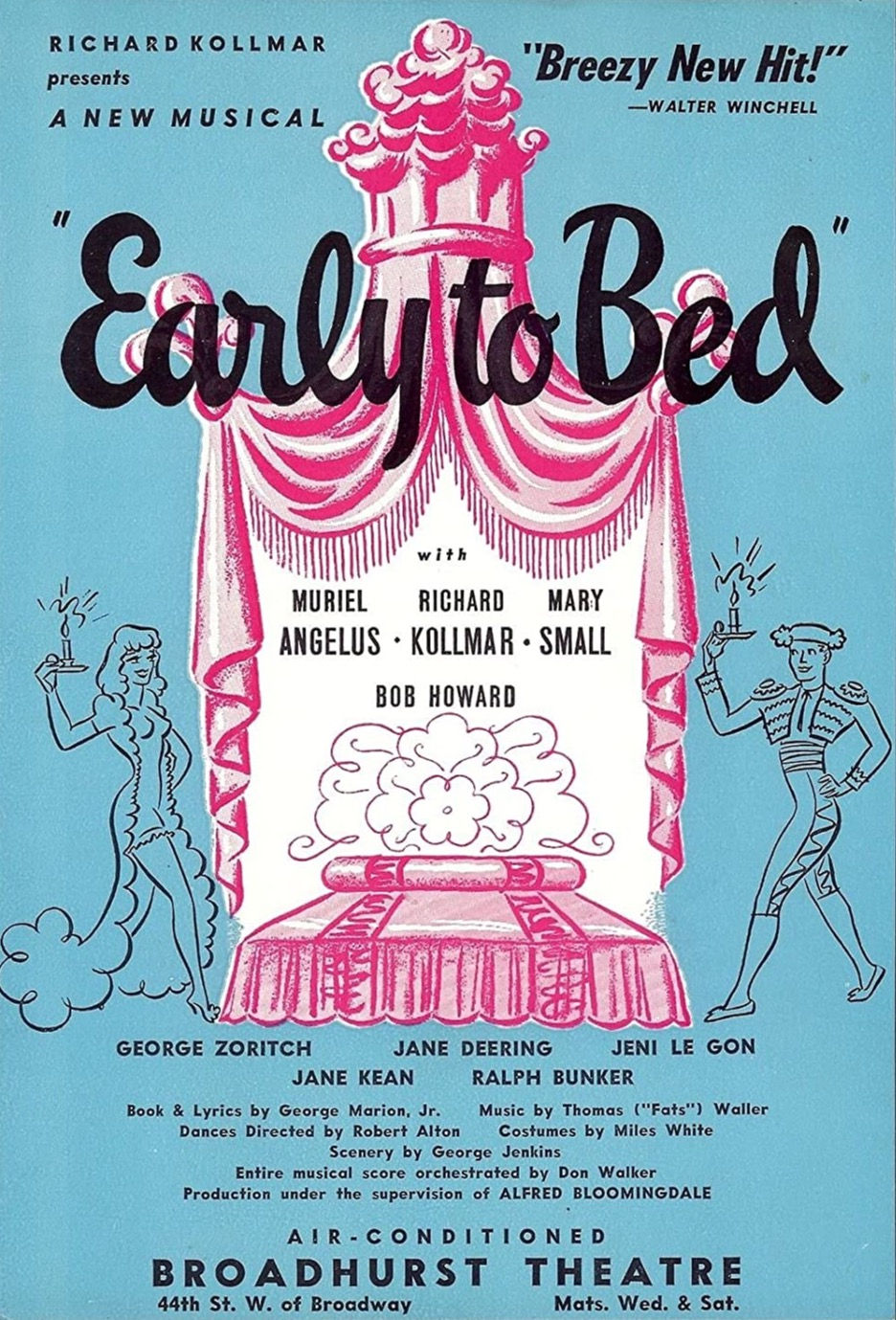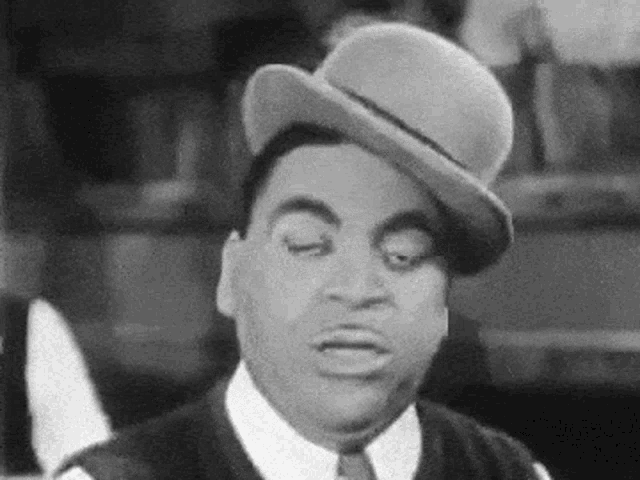
Thomas Wright "Fats" Waller, born May 21, 1904, was an American jazz pianist, organist, composer, violinist, singer, and comedic entertainer. His innovations in the Harlem stride style laid much of the basis for modern jazz piano. His best-known compositions, "Ain't Misbehavin'" and "Honeysuckle Rose", were inducted into the Grammy Hall of Fame in 1984 and 1999.
Waller was the seventh child of 11 born to Adeline Locket Waller, a musician, and Reverend Edward Martin Waller, a trucker and pastor in New York City. He started playing the piano when he was six and graduated to playing the organ at his father's church four years later. His mother instructed him in his youth, and he attended other music lessons, paying for them by working in a grocery store. Waller attended DeWitt Clinton High School for one semester, but left school at 15 to work as an organist at the Lincoln Theater in Harlem, where he earned $32 a week. Within 12 months he had composed his first rag. He was the prize pupil and later the friend and colleague of the stride pianist James P. Johnson. His mother died on November 10, 1920 from a stroke due to diabetes.

Waller married Edith Hatchett in 1920, with whom he had his first son, Thomas Waller Jr. in 1921. In 1923 Hatchett divorced Waller. Waller married Anita Rutherford in 1926. Together, they had a son, Maurice Thomas Waller, born on September 10, 1927. In 1928 Waller and Rutherford had their second son, Ronald Waller.
Waller's first recordings, "Muscle Shoals Blues" and "Birmingham Blues", were made in October 1922 for Okeh Records. That year, he also made his first player piano roll, "Got to Cool My Doggies Now". Waller's first published composition, "Squeeze Me", was published in 1924.
On one occasion his playing seemed to have put him at risk of injury. Waller was kidnapped in Chicago while leaving a performance in 1926. Four men bundled him into a car and took him to the Hawthorne Inn, owned by Al Capone. Waller was ordered inside the building and found a party taking place. With a gun to his back he was pushed towards a piano and told to play. A terrified Waller realised he was the "surprise guest" at Capone's birthday party and was relieved that the kidnappers had no intention of killing him.
In the same year, Waller began his recording association with the Victor Talking Machine Company/RCA Victor, his principal record company for the rest of his life, with the organ solos "St. Louis Blues" and his composition "Lenox Avenue Blues". Although he recorded with several groups, including Morris's Hot Babes, Fats Waller's Buddies (one of the earliest multiracial groups to record), and McKinney's Cotton Pickers, his most important contribution to the Harlem stride piano tradition was a series of solo recordings of his compositions: "Handful of Keys", "Smashing Thirds", "Numb Fumblin'", and "Valentine Stomp". After sessions with Ted Lewis, Jack Teagarden and Billy Banks' Rhythmakers, he began in May 1934 the voluminous series of recordings with a small band known as Fats Waller and his Rhythm. This six-piece group usually included Herman Autrey (sometimes replaced by Bill Coleman or John "Bugs" Hamilton), Gene Sedric or Rudy Powell, and Al Casey.

Between 1926 and the end of 1927, Waller recorded a series of pipe organ solo records. These represent the first time syncopated jazz compositions were performed on a full-sized church organ. In April 1927, Waller played organ at the Vendome in Chicago for movies alongside Louis Armstrong, where his organ-playing was praised for "witty cueing" and "eccentric stop coupling."
Waller performed Bach organ pieces for small groups on occasion. He influenced many pre-bebop jazz pianists; Count Basie and Erroll Garner both revived his hit songs. In addition to his playing, Waller was known for his many humorous quips during his performances.
He enjoyed success touring the United Kingdom and Ireland in the 1930s, appearing on one of the first BBC television broadcasts on September 30, 1938. While in Britain, Waller also recorded a number of songs for EMI on their Compton Theatre organ located in their Abbey Road Studios in St John's Wood.
He appeared in several feature films and short subject films, most notably Stormy Weather in 1943, which was released 21 July, just months before his death. The film was a primary showcase of some of the leading African American performers of the day, during an era when African American actors and singers rarely appeared in lead roles in mainstream Hollywood productions. The cast included Lena Horne, Bill Robinson, Cab Calloway, Katherine Dunham and the Nicholas Brothers. For the hit Broadway show Hot Chocolates, he and Razaf wrote "(What Did I Do to Be So) Black and Blue", which became a hit for Ethel Waters and Louis Armstrong.
In 1938, Waller was one of the first African Americans to purchase a home in the Addisleigh Park section of St. Albans, Queens, a New York City community with racially restrictive covenants. After his purchase, and litigation in the New York State courts, many prosperous African Americans followed, including many jazz artists, such as Count Basie, Lena Horne, Ella Fitzgerald, and Milt Hinton.
Later in Waller's career, he had the distinction of becoming the first African-American songwriter to compose a hit Broadway musical that was seen by a mostly white audience. Broadway producer Richard Kollmar's hiring of Waller to create the 1943 musical Early to Bed was recalled in a 2016 essay about Waller by John McWhorter, an American academic and linguist who is Associate Professor of English and Comparative Literature at Columbia University.

"Even as late as 1943, the idea of a black composer writing the score for a standard-issue white show was unheard of. When Broadway performer and producer Richard Kollmar began planning Early to Bed, his original idea was for Waller to perform in it as a comic character, not to write the music. Waller was, after all, as much a comedian as a musician. Comedy rarely dates well, but almost 80 years later, his comments and timing during "Your Feet's Too Big" are as funny as anything on Comedy Central, and he nearly walks away with the movie Stormy Weather with just one musical scene and a bit of mugging later on, despite the competition of Bill "Bojangles" Robinson, Lena Horne, and the Nicholas Brothers. Kollmar's original choice for composer [of Early to Bed] was Ferde Grofé, best known as the orchestrator of George Gershwin's "Rhapsody in Blue," whose signature compositions were portentous concert suites. But Grofé withdrew, and it is to Kollmar's credit that he realised that he had a top-rate pop-song composer available in Waller."
Waller's double duty as composer and performer was short-lived. During a cash crisis and in an advanced state of intoxication, Waller threatened to leave the production unless Kollmar bought the rights to his Early to Bed music for $1,000. (This was typical of Waller, who often sold melodies for quick cash when in his cups. The evidence suggests, for example, that the standards "I Can't Give You Anything but Love" and "On the Sunny Side of the Street" were Waller tunes.) Waller came to his senses the next day, but Kollmar decided that his drinking habits made him too risky a proposition for eight performances a week. From then on, Waller was the show's composer only, with lyrics by George Marion, whose best-remembered work today is the script for the Astaire-Rogers film The Gay Divorcée.

Six months after the premiere of Early to Bed, it was still playing in a Broadway theater; at that point newspapers reported Waller's premature death. Waller contracted pneumonia and died on December 15, 1943, while traveling aboard the famous cross-country Los Angeles–Chicago train the Super Chief near Kansas City, Missouri. His final recording session was with an interracial group in Detroit, Michigan, that included white trumpeter Don Hirleman. Waller was returning to New York City from Los Angeles, after the smash success of Stormy Weather, and a successful engagement at the Zanzibar Room in Santa Monica, California, during which he had fallen ill. More than 4,200 people were estimated to have attended his funeral at Abyssinian Baptist Church in Harlem, which prompted Adam Clayton Powell Jr., who delivered the eulogy, to say that Fats Waller "always played to a packed house." Afterwards, he was cremated and his ashes were scattered over Harlem from an airplane piloted by an unidentified African American World War I aviator.

A Broadway musical showcasing Waller tunes entitled Ain't Misbehavin' was produced in 1978 and featured Nell Carter, Andre de Shields, Armelia McQueen, Ken Page, and Charlaine Woodard. (The show and Nell Carter won Tony Awards.) The show opened at the Longacre Theatre and ran for more than 1600 performances. It was revived on Broadway in 1988 at the Ambassador Theatre with the original Broadway Cast. Performed by five African-American actors, the show included such songs as "Honeysuckle Rose", "This Joint Is Jumpin'", and "Ain't Misbehavin'".
Since his death he has been inducted into the Songwriters Hall of Fame, the Big Band and Jazz Hall of Fame and the Walk of Fame, along with a Grammy Lifetime Achievement Award. Recordings of Fats Waller were inducted into the Grammy Hall of Fame which is a special Grammy Award established in 1973 to honour recordings that are at least 25 years old and that have "qualitative or historical significance".

Waller copyrighted over 400 songs, many of them co-written with his closest collaborator, Andy Razaf. Razaf described his partner as "the soul of melody... a man who made the piano sing... both big in body and in mind... known for his generosity... a bubbling bundle of joy". It is likely that he composed many more popular songs than he has been credited with: when in financial difficulties he had a habit of selling songs to other writers and performers who claimed them as their own.
The anonymous sleeve notes on the 1960 RCA Victor album Handful of Keys state that Waller copyrighted over 400 songs, many of them co-written with his closest collaborator, Andy Razaf. In the same notes are comments by clarinetist Gene Sedric, who recorded with Waller in the 1930s. "Fats was the most relaxed man I ever saw in a studio, and so he made everybody else relaxed."
Reading Recommendations and Content Considerations

by
Maurice Waller and Anthony Calabrese































































































Comments